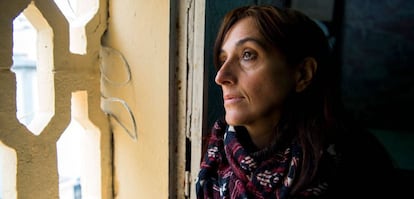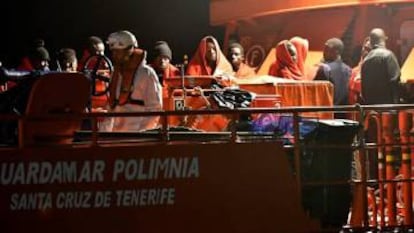Spanish activist in Morocco plagued by accusations of human trafficking
The case was opened by Spanish police after numerous calls by Helena Maleno to sea rescue services


Helena Maleno, a Spanish human rights activist who lives in Morocco, was hoarse and recovering from a four-day fever when she met the press on Wednesday. She had appeared before a Tangiers judge to answer questions regarding her activities, and is due to return in court for a full hearing on January 31.
Maleno, 47, has been living in Tangiers for the last 16 years and is a member of the migrant support association Caminando Fronteras. A Moroccan judge has questioned her over a case file sent to him by the Spanish police, who are accusing Maleno of encouraging illegal immigration and human trafficking.
We cannot set a precedent of persecuting those who do humanitarian work
Human rights activist Helena Maleno
The basis for the accusation is that Maleno receives phone calls from dozens of immigrants telling her that their relatives are adrift out at sea, and asking her for help. She then alerts Spain’s maritime rescue service, which operates in the Strait of Gibraltar.
Asked by the judge about her views on illegal immigration, Maleno replied: “I think that the biggest victims are the migrants themselves. I want it [immigration] to take place legally, through safe channels.”
The judge told her on two occasions that the Moroccan police have found no evidence against her, but that he was being forced to take statements from her because of the Spanish police’s report, said legal sources familiar with the case.
Maleno reportedly told the judge that this case has already been shelved by Spain’s high court, the Audiencia Nacional, and she produced documentary evidence to support this claim. But the judge said he needs official confirmation from Spanish authorities, and has summoned her to appear in court again on January 31 so she can produce further evidence.
“I trust fully in the Moroccan justice system,” Maleno had told EL PAÍS before walking into the courtroom. “It has given me time to prepare my defense. What I don’t understand is why the Spanish police sent Morocco a case file accusing me of human trafficking when a Spanish prosecutor has already said that this case is closed.”
“We cannot set a precedent of persecuting those who do humanitarian work,” she added.
The judge also asked Maleno why so many migrants call her on the phone.

“My number is at their disposal,” she replied. “I don’t personally know many of those who call me: they pass on my number to other migrants, and they call me in emergency cases.”
“And why don’t you call the Red Cross or the Civil Guard?”
“The Red Cross does not have a maritime rescue service, and I call the Civil Guard when there is a migrant boat near the Canary Islands, because rescue work in that area falls to the Civil Guard.”
Maleno has often stated that she calls Spanish maritime rescue services when she receives information about migrants’ lives being in danger in waters of the Strait. She added that she does not make those calls to ensure that the migrants make it into Spain, but to prevent them from drowning out at sea.
“I don’t know what Spanish authorities are waiting for before issuing an official notification about the case being closed,” added Malena. “I am ashamed that my country’s police sent this case to Morocco yet has failed to notify that the Audiencia Nacional shelved the case in April.”
“Everything I am going through, the impact this is having on my life, is because of the Central Unit Against Immigration Networks and Documentary Forgery (UCRIF),” said Maleno, who has two children aged 20 and 11. “I told the judge that defending the right to life is not a crime.”
On Tuesday, there was a public act of support for Maleno outside the cathedral in Tangiers. Around 100 sub-Saharan migrants showed up, along with representatives from Cáritas, Oxfam and the legal foundation Fundación de la Abogacía Española.
I told the judge that defending the right to life is not a crime
Helena Maleno
Carles McCragh, vice president of the foundation, noted that Maleno has already received human rights awards from legal groups for her work.
“What Maleno has done from Morocco is to offer invaluable and necessary support to the migrants,” he said, insisting that her actions have not encouraged migrants to make the dangerous journey. “We cannot blame Helena Maleno for South-North migration. I really don’t believe that any migrant comes to Tangiers because Maleno is here.”
English version by Susana Urra.
Tu suscripción se está usando en otro dispositivo
¿Quieres añadir otro usuario a tu suscripción?
Si continúas leyendo en este dispositivo, no se podrá leer en el otro.
FlechaTu suscripción se está usando en otro dispositivo y solo puedes acceder a EL PAÍS desde un dispositivo a la vez.
Si quieres compartir tu cuenta, cambia tu suscripción a la modalidad Premium, así podrás añadir otro usuario. Cada uno accederá con su propia cuenta de email, lo que os permitirá personalizar vuestra experiencia en EL PAÍS.
¿Tienes una suscripción de empresa? Accede aquí para contratar más cuentas.
En el caso de no saber quién está usando tu cuenta, te recomendamos cambiar tu contraseña aquí.
Si decides continuar compartiendo tu cuenta, este mensaje se mostrará en tu dispositivo y en el de la otra persona que está usando tu cuenta de forma indefinida, afectando a tu experiencia de lectura. Puedes consultar aquí los términos y condiciones de la suscripción digital.








































